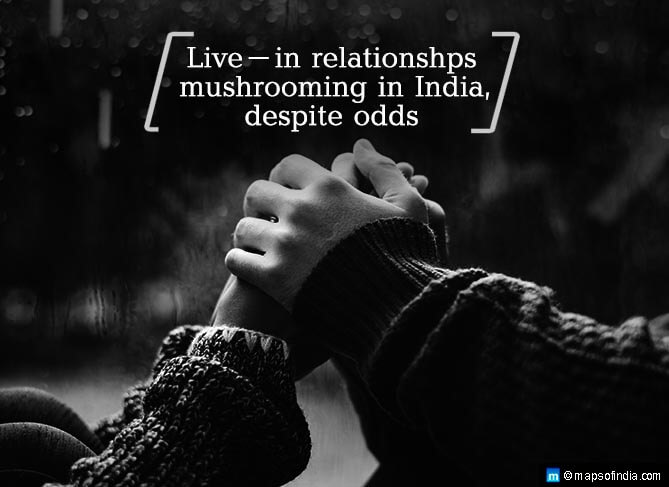
The institution of marriage has been considered as a sacred bond between two individuals. It has been prevailing in India since the ancient times in every religion. The concept of matrimony has got the encouragement, regard and license from the society for two adults to live together peacefully.
A couple ties the knot and inks a lifelong agreement and pledge to remain faithful to each other for their entire life, despite some healthy conflict. But this tie seems to be gradually getting unfastened, with the constant change in society. On top of that, western culture and its impact have been penetrating the minds of youngsters to remain unmarried. So, the concept of live-in relationship is gradually getting popular, where a man and woman live in the same household without going through the rituals of marriage.
Significance of marriage declining
In the digital age, the sanctity of marriage has gone to a certain extent. Tolerance among boys and girls of the current generation is a thing of the past. Hence words like endurance, patience and so on have become a rare commodity among the youth in the present circumstances. Further, the concept of freedom and liberation hastens the cases of divorce and separation in all sections.
Domestic violence, dowry, bride burning and living with in-laws in oppressive conditions and so on has further fuelled the craze for live-in-relationship in India. Though it is an alien innovation, it is increasingly being adopted and actually flourishing in our society. The general perception is that a live-in relationship will bestow a life full of enjoyment without any responsibility.
View of Rajasthan Human Rights Commission
However, Indian society still frowns upon the practice in general. Of late, the Rajasthan Human Rights Commission is on the radar criticising live-in relationships and demanding from the State government and the Centre to “prohibit” this practice, so that women can live a dignified life in the society. A bench of the human rights body felt that women who opt for live-in relationships are like “concubines”. In its order passed on Wednesday, August 4, 2019, the bench said, “We think it is necessary to interpret it because a large number of cases will be coming up before the Courts in our country on this point, and hence an authoritative decision is required.”
Live-in relationship vs Marriage
A typical marriage of Indian nationals in India is governed by the personal laws of Hindu, Muslim and Christian communities, as applicable, or the Special Marriage Act, 1954, which is irrespective of faith or religion. Both the parties to a marriage are thus entitled to certain matrimonial rights as well as obligations under the law of the land.
That brings us to the question- does a woman in a live-in relationship enjoy the same position as a legally wedded wife?
In fact, the Supreme Court (SC) of India has also been seized of the matter regarding the position of women in a live-in relationship from time to time. In the landmark judgement in the case of Indra Sarma Vs V.K.V.Sarma in 2013, the SC concluded that such relationships fall within the ambit of Section 2(f) of the Protection of Women Against Domestic Violence Act, 2005. However, in cases involving live-in relationships, all facets of the relationship must be considered to come to any conclusion. If the requisites of a marriage such as mental soundness of the parties, legal age of marriage, consent, etc. are all satisfied, the couple can be considered to be in a legal live-in relationship. Also, a couple can be considered to be ‘married’ if it can be proved that they were living together for a considerably long period.
Legal provisions governing women in a live-in relationship
With women in live-in relationships experiencing various kinds of harassment and violence, the SC came to their rescue with remedies provided under the Domestic Violence Act, 2005. The act does not specify marriage but a ‘relationship in nature of marriage’ and was deemed applicable to live-in relationships. Similarly, the scope of claiming maintenance under section 125 of the Code of Criminal Procedure, often resorted to by abandoned wives, was also considered wide enough to initiate criminal proceedings against a man who does not provide proper maintenance or deserts a woman with whom he was in a live-in relationship.
Legal provisions governing children in a live-in relationship
Though personal laws do not specify provisions for the maintenance of children born as a result of live-in relationships, maintenance for such children can also be claimed under section 125 of the CrPC.
The judicial system in India considers all children, whether born in or out of wedlock, to be legitimate and have the right to property, including ancestral and self-acquired property. However, live-in couples are not allowed to adopt a child as per the terms laid down by Central Adoption Resource Authority (CARA).
Time for a new law?
So, it seems despite all the pros and cons, live-in relationships have got some legal safeguards. However, the future of women in this type of relationship can be precarious, as each case is to be examined on its merits by the courts. Also, women could be prone to exploitation if they consent to live together under systems like ‘Maitri Karar’. Not all women in live-in relationships are entitled for maintenance or palimony unless they satisfy the conditions stipulated by the courts. Even if they disregard the notion of societal approval, women in live-in relationships do not have access to remedy in personal laws which is definitely a disadvantage.
A live-in relationship can be a liberating experience or a disappointment depending on the expectations of the couple. In a society that shamed premarital sex, accepting a practice like live-in is a big step forward. Maybe it’s time to evolve a special law to define the rights and obligations of partners in live-in relationships and resolve all ethical, moral and legal concerns regarding the same.





